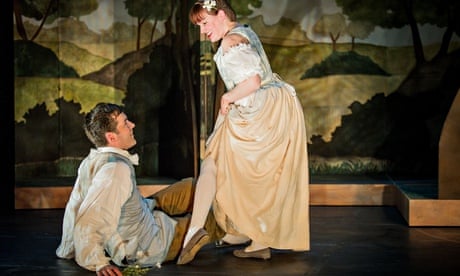Handel's pastoral opera – Greek idyll turned tragic – offers the perfect masterclass in baroque style, and this production marked a happy collaboration between Nicholas Cleobury's Mid-Wales Opera, violinist Rachel Podger's Brecon Baroque and students of the Royal Welsh College of Music and Drama.
Director Annilese Miskimmon opts firmly for early 18th century, but nothing is stilted or overstylised. From an initially unassuming plywood diptych emerges an ingenious, orgami-like, painted set, whose folding and unfolding doors add variety to the basic portrait of rural charm. With movement wittily choreographed to Handel's lilting rhythms and a Feydeauesque charm to Acis and Galatea's in-and-out-the-houses love-chase, all was sunshine and roses. Sudden darkness dispelled that, with the shadow of giant Polyphemus looming large and the transition from first to second act much slicker for going through without interval. Albeit causing a storm and brandishing a newly uprooted tree, Matthew Stiff's Polyphemus had the air of a bit of a bumbler, at first bemused by Galatea, and his violation of her clumsy rather than violent.
Yet Miskimmon's most telling intervention was in the death of Acis: yes, the jealous giant killed him with a stone, but there was no collapse of body in an embarrassing heap. Rather, Acis became first a stone statue, then a walking wraith. It set in train a ritual candle-lit procession, all the more affecting for the hushed pianissimo from Podger and her players. Out of this, Acis's subsequent transformation into a running spring had a feeling of hope and consolation attuned to both myth and music. Jane Harrington's Galatea stood out, her soprano creamy and agile, with Oliver Mercer's Acis developing into a rather noble figure, while Cleobury's handling of his forces, small chorus and student chorus in the wings, ensured that Handel's score was subtly realised.

Comments (…)
Sign in or create your Guardian account to join the discussion